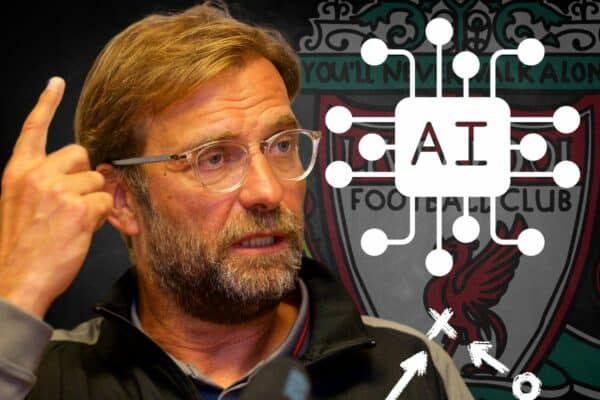Artificial Intelligence (AI) is becoming more commonplace, especially with the introduction of chatGPT and similar this year. Liverpool FC are at the forefront of applying the technology in the football industry.
Football came late to the party.
With endless variables and an ever-changing picture, it has taken a long time for science to infiltrate the beautiful game.
Since its dawn in the 19th century, football has required decision-making based on the experience of individuals or a team.
Statistical analysis has, of course, become a key part of the modern game, but it still relies on the knowledge of an expert to interpret that data in the correct way.
Now, though, AI has almost developed far enough to make decisions for coaches.

While in its infancy, the technology has been more effective when identifying patterns from set pieces due to the more ‘closed’ nature of the task, meaning there are less variables to calculate.
This is why sports such as baseball, cricket and even American football lend themselves far more easily to data-based analysis, as the picture is constantly reset to a pre-determined plan.
In football, though, there could be a limitless number of outcomes possible at pretty much every moment in open play.
AI is beginning to be able to predict what players may do in particular situations, which could help coaches massively when making tactical decisions.
Partnering with Liverpool FC, Google-owned AI company DeepMind are taking a step further.
Thanks, in part, to the research and modelling trialled with Liverpool’s information – the club provided DeepMind with data on every Premier League game played between 2017 and 2019 – they hope to be able to make decisions for managers and effectively create an automated video assistant coach
While Jurgen Klopp‘s style of football may, at times, seem chaotic, the chaos is planned. It is by design.
AI is on its way to being able to make sense of organised chaos and work out how to prevent or bypass it.
Football teams are unlikely to ever rely solely on the advice of computers.
However, the more advanced the guidance becomes, the easier a manager’s job could be.

Despite football’s “inherent uncertainty”, as journalist Amit Katwala described it, predictions are still possible.
‘Ghosting’ is one key way in which the technology could speculate the likelihood of different outcomes.
Referring to a paper published by Liverpool and DeepMind, Katwala explained in Wired how it would work.
“The paper demonstrates how you can train a model on data about a specific team and lineup to predict how its players will react in a particular situation,” said Katwala.
“If you knock a long ball into the right-hand channel against Manchester City, for example, Kyle Walker will run in a particular direction, while John Stones may do something else.
“This is known as ‘ghosting’ – because the alternative trajectories are overlaid on what actually happened, like in a video game.”
This could be useful for predicting how a tactical change or substitution would affect a match.
AI could also be useful in identifying potential transfer targets.
In football terms, the ‘Moneyball’ technique, made famous by the Oakland A’s baseball team, involves statistical analysis in order to find players that exhibit qualities that would best fit your system.
The use of AI would make it even more efficient.
Jason Stockwood, chair of Grimsby Town, wrote in the Guardian about Brighton and Brentford, who are arguably the two highest over-achievers in the Premier League, based on their budgets anyway.
“Rumours suggest that they have armies of “quants” looking to find undervalued players in markets worldwide, similar to Moneyball,” said Stockwood.
“Machine learning (ML) will already be part of their business interests and will be based on the players continuing their trajectories over the following decade and establishing themselves on the European football scene.”
With the Reds striving to stay at the top of the world game, any steps forward in AI will be monitored closely by Liverpool and applied to their own practices where possible.



















Fan Comments